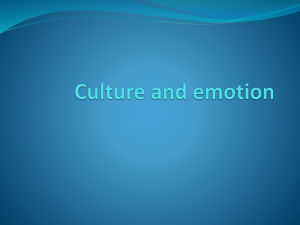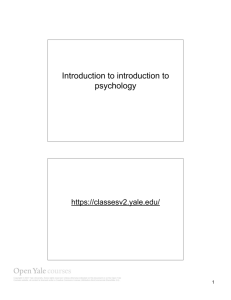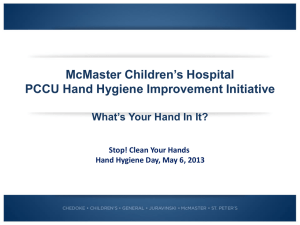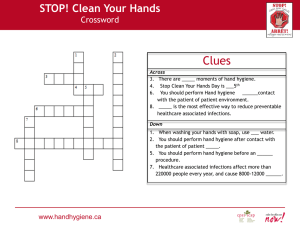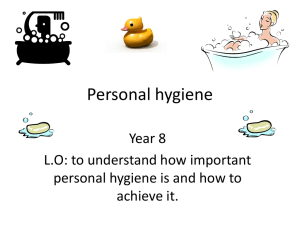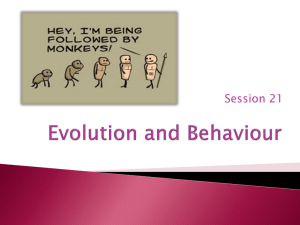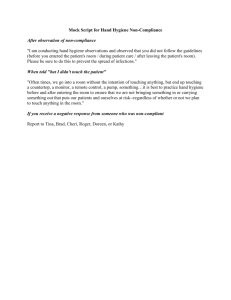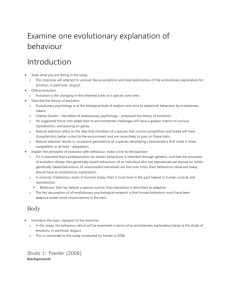PowerPoint Presentation - Armstrong State University
advertisement
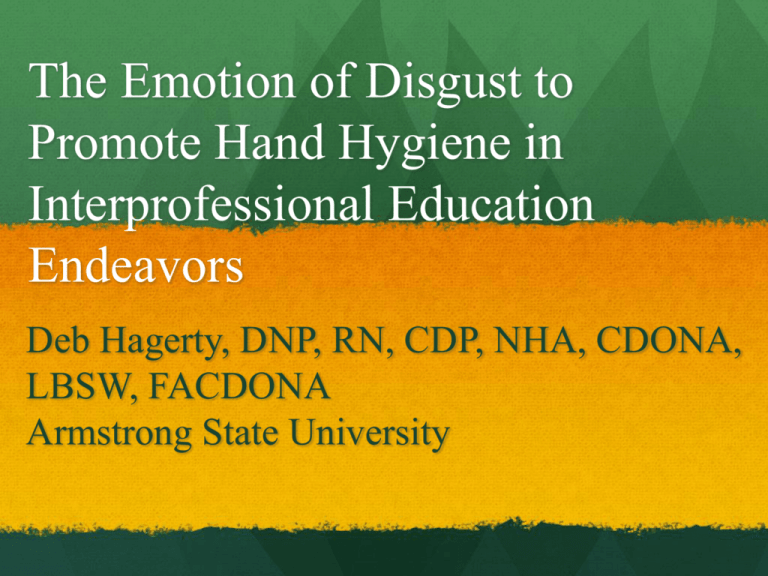
The Emotion of Disgust to Promote Hand Hygiene in Interprofessional Education Endeavors Deb Hagerty, DNP, RN, CDP, NHA, CDONA, LBSW, FACDONA Armstrong State University Disgust Defined Darwin-”Something revolting, primarily in relation to the sense of taste , as actually perceived or vividly imagined; and secondarily to anything which causes a similar feeling, through the sense of smell, touch and even of eyesight” Angyal (1941), Revulsion at prospect of oral incorporation of an offensive object; body wastes, degree of intimacy of contact. (Darwin, 1965, p.253; Angyal, 1941) Purpose of Disgust Disgust dictates what we do. Ancient function as a system that bestows on animals the ability to avoid parasites. Disgust Informs our attitudes of others: Sick and Different Affects attitudes toward cloning and GM food Our Judicial System, Politics Product buying behavior Can trump Love Moral choices (Curtis, 2013, p. ix) Disgust Weaves Lives Weaves through our individual and social lives without this thread societies would fall apart “Strong claim to be essential to human ability to cooperate on a mass scale” (Curtis, 2013, p. ix) Birth of Parasite Avoidance Theory (PAT) Data Collection: International departure lounge What is disgusting? Pus, abnormal appearance people, food spoilage, animal infections, things touching a disgusting object. What is Disgusting 1. Nasty Organic Objects 2. Hygienic lapses 3. Indecency 4. Wickedness 5. Hypocrisy (Curtis, 2013) Why is this Important Parasite avoidance behavior is everywhere in the evolutionary tree of life. The Way Disgust Works We Don’t Wash “Adherence of HCWs to recommended hand hygiene procedures has been reported with very variable figures, in some cases unacceptably poor, with mean baseline rates ranging from 5% to 89%, representing an overall average of 38.7%”. (WHO, 2009, 16.2) Despite Knowing the Importance We Don’t Wash Is it Important?? It is estimated that washing hands with soap and water could reduce diarrheal diseaseassociated deaths by up to 50% . Researchers in London estimate that if everyone routinely washed their hands, a MILLION deaths a year could be prevented . (http://www.cdc.gov/healthywater/hygiene/fast_facts.html) Alcohol Gel? The use of an alcohol gel hand sanitizer in the classroom provided an overall reduction in absenteeism due to infection by 19.8% among 16 elementary schools and 6,000 students. (http://www.cdc.gov/healthywater/hygiene/fast_facts.html) Is this Disgusting? • Average individual swimmer contributes at least 0.14 grams of fecal material to the water, usually within the first 15 minutes of entering. One Trillion Germs One Grams of Feces Improved Handwashing Meta-analysis Reduces rates of Gastrointestinal illness by 31% Respiratory illness by 21% (Aiello,Coulborn, Perez & Larason, 2008) LIFE OR DEATH TO SOMEONE Clostridium difficile infection HAIs (2011) ½ Million infections 29,000 deaths within 30 days of Diagnosis (http://www.cdc.gov/HAI/organisms/cdiff/Cdiff_infect.html) 80,000 Deaths in United States HAI complications in 5-10% of admissions to acute-care hospitals. U.S. at least 80,000 fatalities each year Approx 200 deaths/day from HAI. (WHO, 2014) Handwashing with Soap Protects about 1 out of every 3 young children who get sick with diarrhea 1 out of 6 young children with respiratory infections like pneumonia. (CDC, 2014) Handwashing Observational and Self Reported Rates Rarely exceeds 50% in most environments Community and professional Compliance Rate at 50% or Less HH compliance in the U.S. can increase when monitoring is combined with feedback. HH still occurs at or below 50% for compliance for both ICUs and non-ICUs (MC Guckin, M., Waterman, R., & Govednik, J., 2009) Does Education Work Interventions that rely solely on passive transfer of healthcare information are ineffective at instigating change. (Evans & McCormack, 2008) Observations Bathrooms Overall Hand Washing Behavior and Length of Hand Washing Time (N = 3,749) Variables N % Not Washing 384 10.3 Wetting w/o soap 856 22.8 Washing with soap 2509 66.9 HAND WASH TIME 0 secs 384 10.3 1-4 secs 824 22.4 5-8 secs 1432 38.2 Hand Wash Time N=3749 9-14 secs 911 24.2 15 secs or longer 198 5.3 (Borchgrevink, Cha, & Kim, 2013) Disgust Ancient System System that bestows on animals the ability to avoid parasites. How invertebrates and vertebrates, mammals and primates evolved the behavioral capacities needed to deal with threats from parasites and pathogens. (Curtis, 2013,p. X) Human Capacities Only species to be able to imagine ourselves being disgusted in the future. Evolutionary benefit when plague/Ebola avoid encountering sick. Disgust Lurks “Disgust lurks on the dark side of human nature, rearing its ugly head in bullying; cruelty; class hatred; the exclusion of the sick, the aged, and the disabled; homophobia; racism; war and genocide.” (Curtis, 2013, p. Xi) Disgust in Public Health Psychotherapists learn that disgust can trump love Disgust in moral choice Ethical and Political components First Trimester lower immune response and disgust elevation. Nausea protection from toxins and infections during this vulnerable time. Disgust as a Post-It Note What makes you feel disgust? Do we always have to see to feel? What is Disgust? Lice, mucous, feces, spoiled food,…. Discarded bloody Band-Aid Where a cockroach has been Biting into a restaurant meal only to find a hair in it The thought of someone spitting in your food before it is served. Effectiveness of Disgust The emotion of disgust prompts hand hygiene primarily when dirt is visible. (Whitby et al., 2007) Ghana Public Health Partnerships Handwash Trigger: Powerful emotional disgust response Woman leaving toilet with digitalized red stain on her hands which she transferred to the fufu (food staple) which her child then ate. (Curtis, Garbrah-Aidoo, & Scott, 2007) Disgust As A Strategy 1. Education video 2. Disgust video conveying knowledge in a disgusting context. 3. Control Nature video 96 PARTICIPANTS, RANDOM ASSIGNMENT Results One week later the disgust intervention had modestly improved hand hygiene practice over those with education and control intervention combined. (Porzig-Drummond, Stevenson, Case, & Oaten, 2009) Disgust as Strategy Graphic disgust-promoting posters in two washrooms at a university library Similar educational information but without the disgust inducing content in two washrooms Results Disgust Intervention Significantly Increased Hand-hygiene Behavior Over The Education Intervention. (Porzig-Drummond, Stevenson, Case, & Oaten, 2009) Hygiene is a World Value Hygiene is a common value around the world. Hygiene practices may have more to do with social and aesthetic considerations than health. (WHO, 2011) Mothers Want to Hold and Love Kids This Will Only Happen If They Are Clean Social Motivation Motives 11 Country Study Disgust at the idea that fecal material might be present on hands was consistently reported to be the most powerful motivator of hand washing with soap and water after using the toilet. (Curtis, 2013, p. 83) DO IT YOURSELF VACCINE LOW COST DEFENSE Ethics of Disgust Practitioners are Challenged to Ensure Interventions Meet Ethical Standards of Professional Practice. The Global Public Private Partnership for Handwashing (PPPHW) Global Handwashing Day is October 15 May 5 is Hand Hygiene Day Collaboratives Colgate-Palmolive FHI-360 London School of Hygiene and Tropical Medicine Procter & Gamble The Water and Sanitation Program The Water Sanitation and Supply Collaborative Council Collaboratives UNICEF Unilever University at Buffalo-The State University of New York USAID Dow Chemical (Resources) YOUR NEW COLLABORATIVE ACTION Organizational Data Collection between cooperating institutions or clinics Target the problem Celebrate the National Day-May 5 Talk about it-Have The Conversation and ask… Do You Know How to Save Lives?? Should Disgust Be In Your Intervention Toolbox??? References Agency for Healthcare Research and Quality. (2013). Making health care safer II: An updated critical analysis of the evidence for patient safety practices. (Evidence Reports/Technology Assessments, No. 211). Rockville (MD): Author Aiello, A. E., R. M., Coulborn, Perez, V., & Larson, E. L. (2008). The effect of hand hygiene on infectious disease risk in the community setting: A meta-analysis. American Journal of Public Health, 98, 1372-1381. Angyal, A. (1941). Disgust and related aversions. Journal of Abnormal and Social Psychology, 36, 393-412 Borchgrevink, C. P., Cha, J., & Kim, s. (2013). Handwashing practices in a college town environment. Journal of Environmental Health, 75(8), 18-24. CDC (2014). Show me the science-why wash your hands. Retrieved from http://www.cdc.gov/handwashing/why-handwashing.html References Curtis, V. (2013). Don’t look, don’t touch, don’t eat. The science behind revulsion. Chicago, Illinois: The University of Chicago Press Darwin, C. R. (1965). The expression of the emotions in man and animals. University of Chicago Press. Chicago: Evans, W. D., and McCormick, L. (2008). Appying social Marketing in health care: Communicating evidence to change consumer behavior. Medical Decision Making, 28, 781-792. Glenn, L., Bolls, P., Thomas, E. (2009). Scare’em or disgust’em: The effects of graphic health promotion messages. Health Communication, 24, 458. doi: 10.1080/10410230903023493 447- Porzig-Drummond, R., Stevenson, R, Case, T., & Oaten, M. (2009). Can the emotion of disgust be harnessed to promote hand hygient? Experimental and fieldbased tests, Social Science & Medicine, 68, 1006-1012. References World Health Organization. (2001). Water for health: Taking charge. Retrieved from ile:///Users/admin/Desktop/Interprofessional%20conf%20Disgust/ wwdreportchap4.pdf Whitby, M, Pessoa-Silva, C. L., McLaws, M. L., Allegranzi, B., Sax, H., Larson, … Pittet, D. (2007). Behavioural considerations for hand hygiene of Hospital Infection, 65, 1-8. E., practice:The basic building blocks, Journal World Health Organization. (2009) Guidelines On hand hygiene in health care: First global patient safety challenge clean care is safer care. Hand hygiene practices among health-care workers Retrieved from http:// www.ncbi.nlm.nih.gov/books/NBK144026/ References World Health Organization. (2014). Clean care is safer care: Evidence for hand hygiene guidelines. Retrieved from http://www.who.int/gpsc/tools/ faqs/evidence_hand_hygiene/en/
